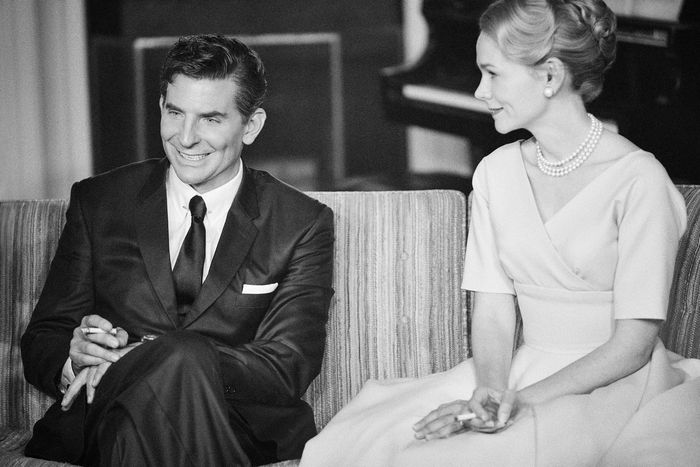
Over the last few months, our great mother the internet has given birth to hundreds of scathing-hot takes about the categorically large prosthetic nose Bradley Cooper wears to play famous Jewish conductor Leonard Bernstein in his second directorial effort, Maestro. Everyone from the Anti-Defamation League to Bernstein’s own family to, for some reason, New York restaurateur Keith McNally, has taken a side on the matter, with some calling the nose anti-Semitic, some saying it’s inaccurate or unnecessary, and some just drinking their coffee and walking their dogs and watching the sunset, free of the unholy weight of having to generate an opinion.
I saw Maestro this morning at the Venice Film Festival and my government-mandated take is that the nose is a little bit distracting in its hugeness, but only for a few minutes at the beginning of the movie and then after that in moments of direct sunlight, and only because Bradley Cooper already has kind of a big nose, so what are we even doing here, exactly? Aside from that, I happened to like Maestro, finding it sensitive and stirring if uneven, and occasionally transcendent, mostly whenever Carey Mulligan is on-screen as Bernstein’s wife, the incredibly named Felicia María Cohn Montealegre. I like that Cooper is developing a signature style, and a penchant for making devastating and complex romances wherein one party dies tragically, for playing extremely tan musicians who blow coke in the daytime to signify rock-bottom, for inserting into his features several scenes of tormented men sitting gloomily at their pianos. I like that Cooper goofily humanizes Bernstein by showing him taking shits with the bathroom door open, or wearing embarrassing-Jewish-intellectual-dad things like a Harvard sweatshirt with the word “Harvard” written in Hebrew.
That the movie is primarily Mulligan’s has been the consensus on the Lido so far, as has chatter that the nose is a little weird but, whatever, who cares. At the press conference this morning, which Cooper skipped out of strike solidarity, makeup artist Kazuhiro Tsuji, who turned Cooper into Bernstein every morning for five hours straight from 2 a.m. to 7 a.m., apologized for the whole hullabaloo. “I wasn’t expecting [the controversy] to happen,” he said. “I feel sorry that I hurt some people’s feelings. My goal and Bradley’s goal was to portray Lenny as authentically as possible. Lenny had a really iconic look that everybody knows.”
Would a nose by any other name smell as controversial? I don’t know. But I am here to suggest that we are asking the wrong questions about it. As Bernstein himself put it in a quote featured at the beginning of Maestro, “A work of art does not answer questions, it provokes them; and its essential meaning is in the tension between the contradictory answers.” With that guiding principle in mind, the only Maestro nose question I am actually interested in exploring is: Are noses to Bradley Cooper what feet are to Quentin Tarantino?
Let’s briefly examine the evidence. In Cooper’s first and perfect film, 2018’s A Star Is Born, he plays Jackson Maine, the heterosexual Leonard Bernstein of rock ‘n’ roll, who falls in love with burgeoning singer Ally (Lady Gaga) in large part due to her schnoz. The film centers on Ally’s nose as a kind of fetish object, both from the perspective of Jackson and the camera itself.
In an early scene, Ally, who has the aquiline profile of a young Barbra Streisand, laments that “every single person I’ve come in contact with in the music industry has told me that my nose is too big and that I won’t make it.” Jackson looks at her hornily. “I think your nose is beautiful,” he says. Shortly thereafter, in a much-memed scene where he drops her off at home after a hot night out on the town, he rolls down his car window. “I just wanted to take another look at you,” he says. She smiles, turns to the side, and traces the shape of her face for him, emphasizing the outline of her nose. They spend the rest of the movie on top of each other.
Later, after Ally rises to real fame, she stares at a gigantic billboard of her face overlooking Los Angeles. “You always said you like my nose,” she tells Jackson, whose arms are wrapped lovingly around her. “I love your nose,” he confirms. “Well, it’s real big up there,” she says. Jackson can barely contain his visible lust — here, Cooper’s nose fetish and possible macrophilia collide. “I wish it was bigger up there,” he says. “The whole thing should just be your fucking nose. Fuck all those people who ever said anything.” They cackle into the wind. “Just the nose?” she says. “That’s so ridiculous.”
On their own, these exchanges feel benign enough, but paired with the painstakingly rendered Maestro schnoz, they suggest an emerging pattern, a theme too on-the-nose (forgive me) to be a mere coincidence. (And just look at his dating history! These are noses of legend!) Is the idea of a billboard of someone’s nose ridiculous, or is it a visual key that unlocks Cooper’s true artistic and perhaps erotic inspiration, the cinematic hallmark of a man driven gently mad by an all-consuming obsession, one that now threatens to make him a topic of conversation at Yom Kippur break-fasts the world over this fall? We’ll have to wait for Cooper’s third feature to be sure. In the meantime, as the debate rages on, let’s all remember to heed Felicia’s wise words, as spoken in Maestro: “Life is not that serious.”
More From Venice
- Agnieszka Holland’s Green Border Is an Urgent Warning
- Ava DuVernay’s Origin Devastates Its Audience
- If Glen Powell’s Not Already a Star, This Movie Will Make Him One


